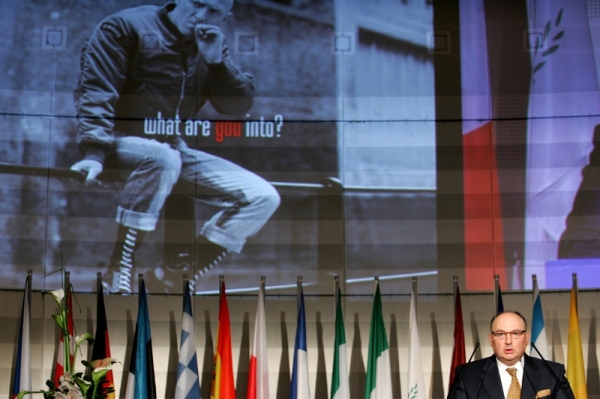Russian oligarchs failed to get off new EU blacklist
Hungary failed to get three Russian and three Chinese names delisted, as the EU approved its 13th package of sanctions on Wednesday (21 February) — ahead of the second anniversary this weekend of Russia’s full-scale invasion of Ukraine.
Hungary had pushed to get Russians Moshe Kantor, Nikita Mazepin, and Alisher Usmanov deleted from an existing Russia blacklist which was being rolled over for another six months, diplomatic sources said.
Hungary had also tried to shield three Chinese firms — Guangzhou Ausay Technology, Shenzhen Biguang Trading, and Yilufa Electronics — from incoming EU sanctions to mark the second anniversary of the war on Saturday (24 February).
Kantor is a Russian fertiliser tycoon who used to front the European Jewish Congress, an NGO in Brussels.
Mazepin is the 24-year-old Formula 1 racing driver son of a Russian chemicals oligarch, who won a case at the EU court in Luxembourg last year freeing him to compete in European events, but who remains under an EU ban in other terms.
Usmanov is a metals baron and Russia’s 12th richest man, whose family-trust-owned yacht, the Dilbar, worth €700m, was impounded by Germany.
The Chinese firms stand accused by the EU of helping Russia to buy prohibited weapons technology from the West.
They are to be hit with EU export curbs in the 13th round of Russia sanctions, agreed by EU ambassadors in Brussels on Wednesday (21 February).
The main thrust of the 13th round blacklists 108 individuals and 87 entities, most of which are Russian arms firms and their bosses and minor Russian officials.
"No person or entity has been taken off" the original proposal, an EU diplomat said.
It also blacklists North Korea’s defence minister and Russian firms shipping North Korean ammunition to Ukraine.
And it cites Belarusians as well as Russians involved in abducting tens of thousands of Ukrainian children from Russian-occupied regions in Ukraine.
The 13th round enters into force when it is published in the EU’s Official Journal — a move due by Friday.
Hungarian prime minister Viktor Orbán has long curried favour with the Russian and Chinese regimes despite his deeper Western alliances.
But his veto-bark has been worse than his bite in the past month, in which he also unblocked EU financial aid for Ukraine and Sweden’s Nato accession.
In theory, member states could still introduce last-minute "reserves" on the 13th round of Russia sanctions before Friday, but there was "no reason to think" this would happen based on Wednesday’s talks, an EU diplomat said.
Meanwhile, EU countries are already in talks on a 14th package, which is to include novel economic measures.
They are also preparing to blacklist those involved in the death of Russian anti-corruption hero Alexei Navalny in his Arctic prison on 16 February.
Navalny’s death led to an outpouring of grief by EU leaders and the general public, amid growing European pessimism on the Ukraine war in opinion surveys.
Senior EU politicians and military chiefs have also begun warning that Russia was preparing for war with Nato in the next few years.
The 13th round of sanctions will take to over 2,000 the number of individuals and entities on the EU blacklist.
Europe has also impounded €320bn of Russian assets and banned €130bn in trade over the past two years to hamper its military effort.
But dozens of leading EU firms continue to do business in Russia, sending a mixed message on Western strategy and values.
These include Hungary and Germany’s biggest banks, OTP and Deutsche Bank, for instance.
And when asked by EUobserver if Navalny’s death would hasten its exit from the Russian market, OTP said on Tuesday it was not prepared "to sell our [Russian] subsidiary at deeply below its value" in order to quit Russia.
Russia’s killing of Navalny also changed nothing for Deutsche Bank, which replied on Tuesday by saying "we are winding down our remaining business" in Russia" — in a snail’s pace process that will pass its own two-year anniversary in March.
"On one hand we’re telling people to prepare for war [with Russia], on the other hand, it’s business as usual for our big firms and banks," an EU diplomat said.

